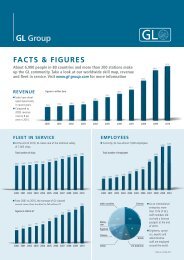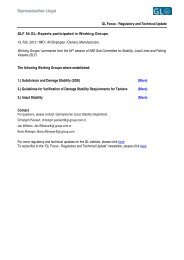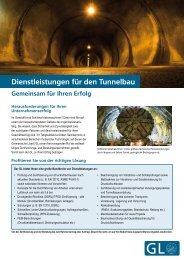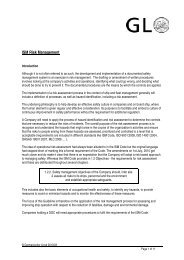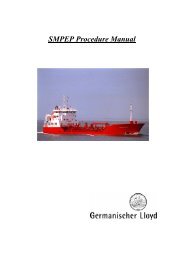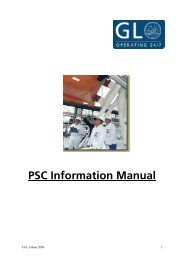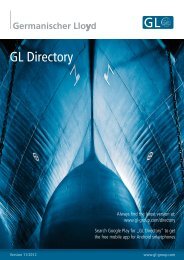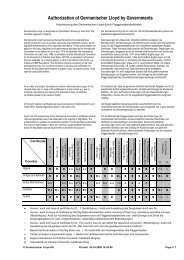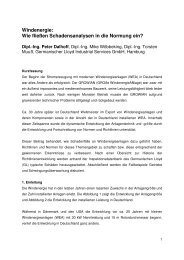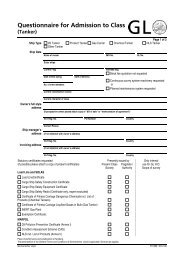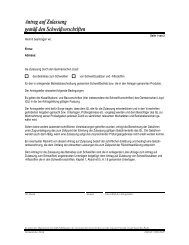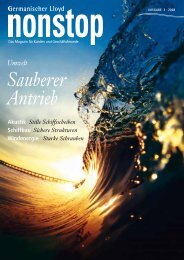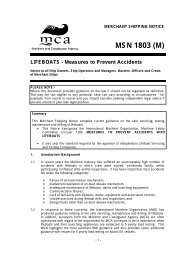Yards Moving Forward - GL Group
Yards Moving Forward - GL Group
Yards Moving Forward - GL Group
You also want an ePaper? Increase the reach of your titles
YUMPU automatically turns print PDFs into web optimized ePapers that Google loves.
EU-GREEN PAPER<br />
Holistic Approach<br />
European Commission presents a maritime policy draft.<br />
“How inappropriate to call this planet Earth when it is quite<br />
clearly Ocean!” With this quote by the British science fiction<br />
author Arthur C. Clarke, the EU Commission introduced its<br />
Green Paper of May 2006, with which it wishes to spark a discussion<br />
on a European maritime policy. Here it is taking a new<br />
course: the ocean should no longer serve merely as a source of<br />
raw materials or be regarded exclusively from a sectoral policy<br />
viewpoint, but is to be treated in a holistic way.<br />
The maritime industry, comprising the sectors of shipping,<br />
shipbuilding, ports, fisheries, offshore energy production<br />
and tourism, constitues an important economic factor in<br />
all European coastal states. With respect to marine research<br />
and maritime innovation, Europe occupies a leading position.<br />
At the same time, the economic utilization of the common<br />
maritime space throws up a number of questions which<br />
should be best solved by general agreement. These include<br />
marine and air pollution, natural catastrophes as a result of<br />
climatic change, accident risks in large-scale shipping, overfishing<br />
and the tense competitive situation of Europe’s maritime<br />
industry in the age of globalization.<br />
So far, most of these challenges have been faced by the EU<br />
with individual technical measures that address a specific<br />
sector, such sea as shipping or fisheries, without considering<br />
the ocean as a whole. To alleviate this need, the EU Commission<br />
presents a number of deliberations in the Green Paper<br />
now available for discussion.:<br />
Through an integrated coastal zone management, the<br />
multiple uses of the coastal regions, their impacts and future<br />
development projects can be coordinated, with the possibility<br />
of combining the planning activities for the sea, the land and<br />
their interface areas.<br />
With the establishment of a European marine observation<br />
and data network, the state of the oceans can be monitored<br />
together with the safety risks for shipping and fisheries. Moreover,<br />
the EU Commission is also considering a comprehensive<br />
mapping of the various coastal regions, a veritable “EU Atlas<br />
of the Seas”.<br />
As regards preventive coastal protection, the EU Commis-<br />
34 nonstop 3/2006<br />
sion believes that a concerted European approach is needed<br />
to achieve effective flood and environmental protection and<br />
to take adequate precautions against natural catastrophes.<br />
The Commission’s proposal of setting up a European<br />
coast guard – with statutory tasks – has already generated<br />
much discussion.<br />
Another catalogue of proposals deals with the international<br />
competitiveness of the European flags, polishing the<br />
image of the shipping sector and measures aimed at improving<br />
the attractiveness of seafaring professions. The suggestions<br />
range from a course of training providing equal qualification<br />
for shipboard and shore duties, improved working and<br />
social conditions for mariners, to deliberations on an optional<br />
EU ship register.<br />
The Green Paper, which was compiled under the leadership<br />
of the Maltese EU Commissioner Dr. Joe Borg, regards<br />
marine research as being one of the most important pillars of<br />
a future EU maritime policy. Through a marine research network<br />
and a common European internet portal, information<br />
on all the research activities within the Union may be made<br />
transparent.<br />
The position paper also takes a stance on the “international”<br />
dimension of maritime policy: there are no less than twelve<br />
subsidiary organizations of the United Nations that concern<br />
themselves with maritime matters. From the viewpoint of the<br />
EU Commission, there are urgent problems that call for an<br />
international solution, e.g. the ecological scrapping of ships,<br />
piracy, the compliance with international obligations by flag<br />
states and accident prevention. Moreover, the EU Commission<br />
wishes to join the International Maritime Organization as a<br />
member, in order to strengthen the European influence and to<br />
increase the political clout of its member states.<br />
With its abundance of proposals of varying significance,<br />
the Green Paper represents an ambitious project. Whether<br />
the “European vision for the oceans and seas” in its present<br />
form meets with the desired acceptance must be gauged from<br />
the statements the Commission has requested by 30 June<br />
2007 ■ CH<br />
PUTTING IT ALL INTO CONTEXT: GREEN AND WHITE PAPERS UNRAVELLED<br />
The purpose of the Green Paper on a Future Maritime Policy is to examine all the activities in Europe which have an impact or are linked to the oceans and<br />
seas and the policies dealing with them. The Green Paper is accompanied by a number of background documents. They were produced by European Commission<br />
Working <strong>Group</strong>s and by the Maritime Policy Task Force made up of member states’ experts in the sea-related sectoral policy areas, which oversaw<br />
the drafting of the Green Paper. The European Union involves its citizens in the legislative process by producing these green or white papers. Green papers<br />
serve the purpose of creating a public and economic discussion. Individuals or organizations are able to comment in an Internet forum on the issues<br />
addressed. Often, a white paper evolves after the completion of the discussion phase. White papers contain formal proposals for action in a particular policy<br />
area with the aim of developing this further. Every year, up to 15 green and 1 to 3 white papers are drawn up. They provide the basis for the legislative<br />
process and offer points of reference for future laws.<br />
For further information (on participation in the EU): http://ec.europa.eu/yourvoice/index_en.htm



